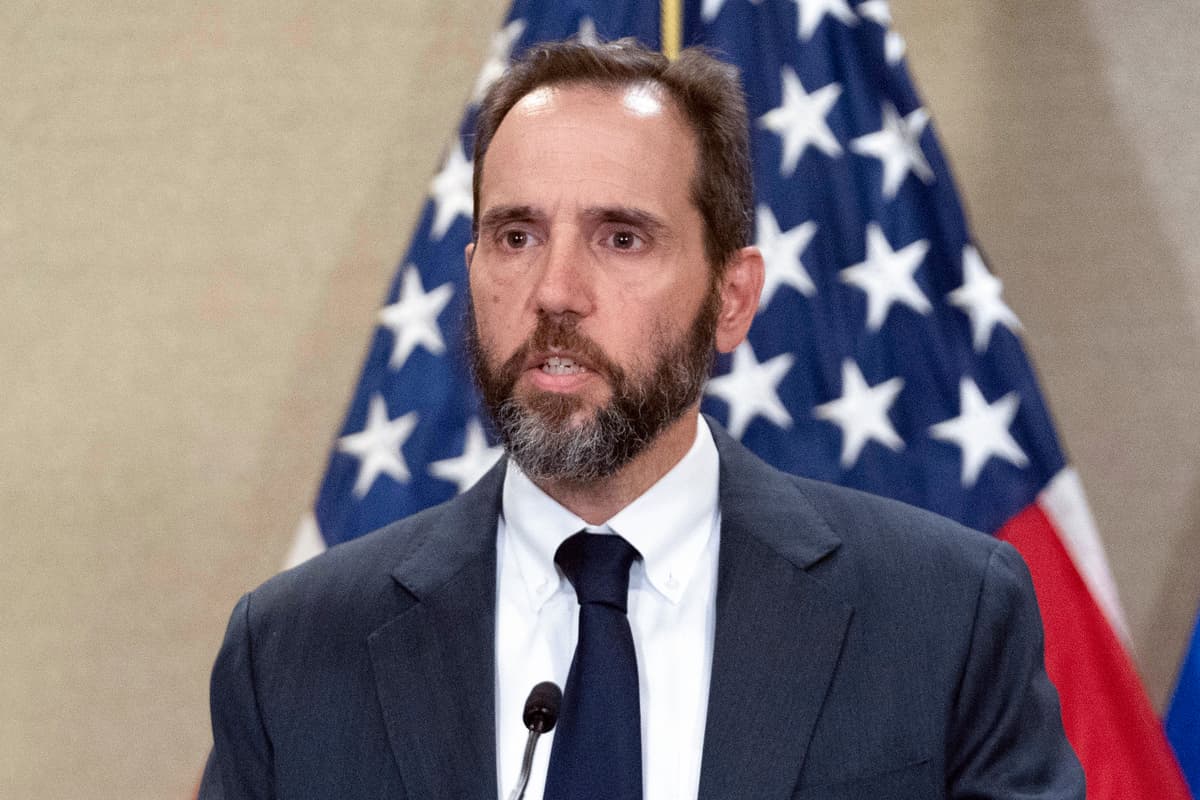With Fani Willis Teetering Amid Boyfriend Furor, Could Jack Smith Step in To Save Her Case?
All but one of the special counsel’s unindicted co-conspirators has been charged by the district attorney, setting the stage for intriguing opportunities for synergy.

A hearing tomorrow at Fulton County could decide whether District Attorney Fani Willis is disqualified from trying the sprawling racketeering case against President Trump and 18 others that she charged in August. Could Special Counsel Jack Smith be positioned to take up that baton?
Ordinarily one might predict chaos if Ms. Willis and her boyfriend are removed as prosecutors against Mr. Trump and others. An unrelated case in which Ms. Willis also handed up racketeering charges only to be disqualified a year and a half ago has yet to find a new prosecutor.
If Ms. Willis is not allowed to carry on, a state entity, the Prosecuting Attorneys’ Council of Georgia, would be tasked with finding her replacement. In the wake of a disqualification ruling, though, there is likely to be a renewed push from a chorus of defendants to dismiss the charges entirely. Motions to that effect have already been filed, including from Mr. Trump.
Georgia, though, does not exist in a vacuum. Just short of a 10-hour drive to the north of Fulton County is the District of Columbia, where Mr. Smith’s skinny January 6 indictment — it only charges one defendant, Mr. Trump — stands in stark contrast with Ms. Willis’s kitchen sink approach. It is nonetheless possible that Mr. Smith never intended that sole focus to be the last word.
That’s because he folded into his indictment six unindicted co-conspirators. They were unnamed — but amply described — in the text. By now, though, they are known to be Mayor Giuliani and attorneys John Eastman, Sidney Powell, Jeffrey Clark, Kenneth Chesebro, and Boris Epshtyn.
All save Mr. Ephstyn were indicted by Ms. Willis. Ms. Powell and Chesebro have both pleaded guilty and entered into cooperation agreements with the district attorney’s office. The most significant discrepancy between the two indictments is the treatment of Mr. Trump’s erstwhile chief of staff, Mark Meadows.
Mr. Meadows is neither charged nor listed as an unindicted co-conspirator in Mr. Smith’s bill, while he is one of the central protagonists of Ms. Willis’s case. His request to remove his trial to federal court rather than face a Fulton County jury has been, besides the fate of Ms. Willis, the racketeering case’s central drama.
The mystery of why Mr. Meadows was not charged by Mr. Smith when he is everywhere in Ms. Willis’s indictment was answered by ABC News in October. The broadcaster reported that the North Carolinian has entered into a cooperation agreement with the special counsel, telling him that Mr. Trump was being “dishonest” with the public and that “obviously” he knew he did not win the election.
Mr. Smith, though, could conceivably charge every one of his unindicted co-conspirators — or anyone else, for that matter — by issuing what is called a “superseding indictment,” or a revised document that takes the place of the original. The special counsel has already pursued that strategy before, in the Mar-a-Lago case, where a second indictment added two of Mr. Trump’s employees, Waltine Nauta and Carlos De Oliveira, to the charge sheet.
Any defendant — hypothetically — charged by both Mr. Smith and Ms. Willis is likely to at least entertain the possibility of a double jeopardy objection. Mr. Trump already has mounted such an objection. His hangs on his impeachment and acquittal by the Senate. The Supreme Court, though, has held that state and federal prosecutions are the work of “two sovereigns” and thus do not violate the Fifth Amendment’s ban.
Memorable dissents to this position come, in Gamble v. United States, from Justices Neil Gorsuch and Ruth Bader Ginsburg. Justice Gorsuch wrote in that case that a “free society does not allow its government to try the same individual for the same crime until it’s happy with the result.” He reaches back to find that the “Roman Republic and Empire incorporated a form of double jeopardy protection in their laws,” and that the Hebrew bible “and later church teachings endorsed the bar against double jeopardy too.”
The possibility of coordination — explicit or implicit — between the District of Columbia and Fulton County is not entirely theoretical. Receipts adduced by one of the attorneys pushing for disqualification of Ms. Willis disclose that Special Prosecutor Nathan Wade billed Fulton County, to the tune of $450,000, for two meetings with the feds — “Travel to Athens; Conf with White House Counsel” and “Interview with DC/White House.”
Both of those conferences occurred after Mr. Smith handed up his indictment and before Ms. Willis handed up hers. The district attorney, though, told an Atlanta radio station last summer, “I don’t know what Jack Smith is doing and Jack Smith doesn’t know what I’m doing. In all honesty, if Jack Smith was standing next to me, I’m not sure I would know who he was. My guess is he probably can’t pronounce my name correctly.”
For Mr. Smith, deciding to charge more defendants would be a heavy lift, as his case against Mr. Trump is snarled before the Supreme Court. The justices will hear oral arguments on the issue of presidential immunity the week of April 22, likely pushing a trial date to the summer or early fall. Fani Willis’s other defendants, though — and Mr. Smith’s unindicted co-conspirators — could provide a list of names that lacks the benefit of presidential privileges.

